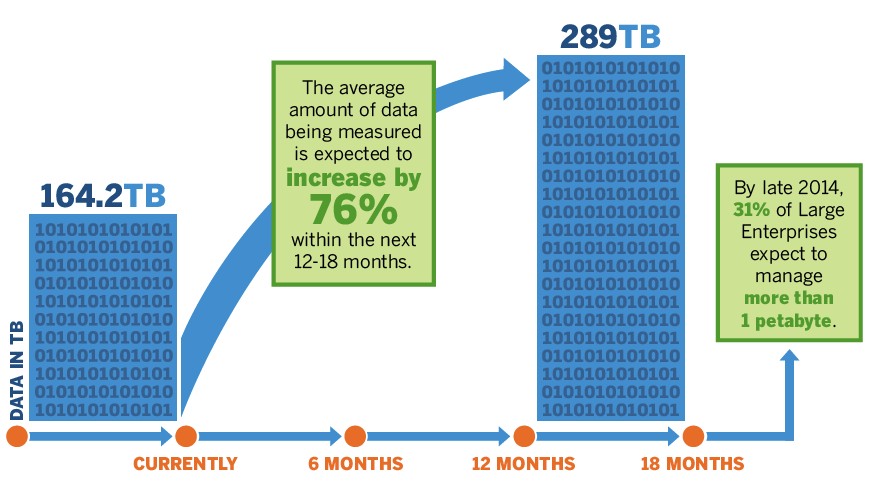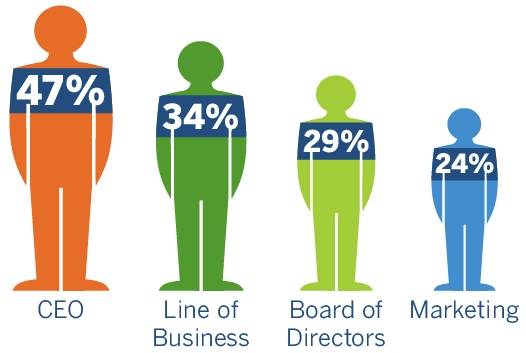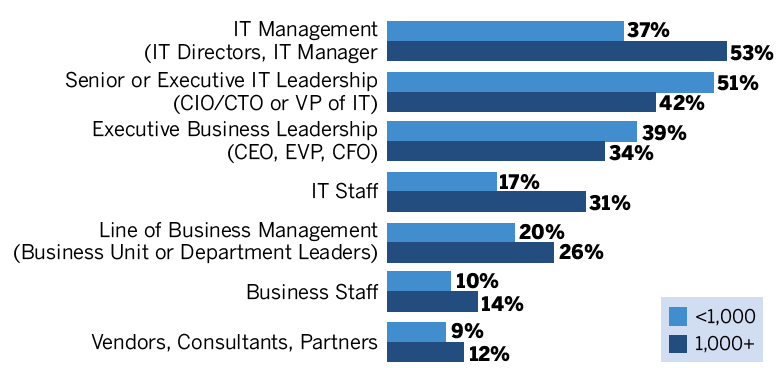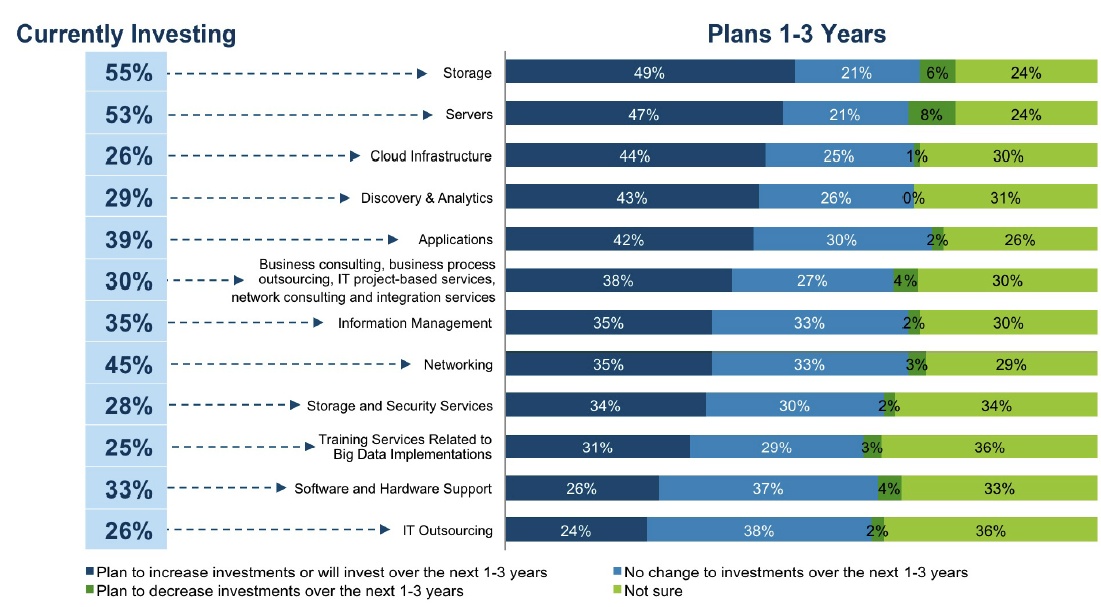CEOs Call for Big Data, IT to Lead Investment Decisions – IDG Enterprise
High/critical priority for 60% of enterprises and 46% of SMBs
This is a Press Release edited by StorageNewsletter.com on January 17, 2014 at 3:05 pmIDG Enterprise – the media company comprising of Computerworld, InfoWorld, Network World, CIO, DEMO, CSO, CIO Executive Council, ITworld, CFOworld and CITEworld – releases the results from the 2014 IDG Enterprise Big Data research which delves into big data investments, expectations, challenges and vendor solutions as CEOs put more emphasis on big data strategies.
The research demonstrates that big data initiatives continue to be a high/critical priority for 60% of enterprise organizations (1,000+ employees) and 46% of SMBs (<1,000 employees).
For this study, big data is defined as large volumes of a variety of data collected from various sources across the enterprise. Respondents indicated that the amount of data being managed per organization will increase by an average of 76% in the coming 12 to 18 months from 164.2TB to 289TB. The top sources contributing to this growth are emails, customer databases and word documents.
Amount of Data Climbing Sharply
CEOs Allocating Big Dollars for Big Data
Big data as an enterprise initiative is beginning to gain momentum. Half of the respondents are in the process of implementing or are likely to implement a big data solution and an additional 12% have already deployed a big data project. These individuals estimate that their organization will spend an average of $8 million on big data initiatives over the next year. In turn, business management, particularly the CEO, is leading the charge on the need for big data strategies. Business leadership is looking to IT management to build the necessary strategies to utilize big data based on company goals. Once implemented, IT executives play a key role in capturing, storing, searching/storing, sharing, analyzing and visualizing data.
CEOs Largest Supporter of Big Data Efforts
There are numerous goals driving big data investment, particularly, improving the quality of decision-making (59%), increasing the speed of decision-making (53%), improving planning and forecasting (47%), developing new products/services and revenue streams (47%), and new customer acquisition/customer retention (44%). When measuring the value of those investments the top success factors considered critical or very important are: identifying areas and processes where big data can have the greatest impact (81%); making sure human capital exists to effectively extract value from big data initiatives (72%); and identifying the best big data tools or resources that will integrate with legacy infrastructure (70%).
“The potential benefits from analyzing data are limitless and three quarters of organizations predict that big data will be in mainstream use within the next three years,” said Matthew Yorke, CEO, IDG Enterprise. “It is not surprising that 70% of enterprise organizations are investing in big data, compared to 56% of SMB organizations. Some of the biggest winners in this, within enterprise organizations, will be marketers who partner with IT to better understand their customer data, activities and drivers.”
IT Leads Big Data Strategies at Enterprises
Current and future investments are focused on two areas for the majority of organizations, storage (55% currently and 49% plan to increase investments in the next 1-3 years) and servers (53% and 47% respectively). However, respondents anticipate a jump in cloud infrastructure investments over the next three years (26% and 44% respectively). Additionally, organizations are investing in data analytics (52%), data mining (42%) and data visualization (36%) to gain business value.
Big Data Investments to Remain Strong
Big Data Adoption and Security Challenges
Although organizations are investing in big data, budget limitations are considered the biggest challenge, followed by limited availability of skilled employees to manage and analyze big data and security. Enterprise organizations are also facing business process and organizational culture issues in big data adoption.
Skill sets are a key challenge because organizations are looking for individuals with specialized expertise. The majority of organizations currently employ database programmers, business analysts and data analysts in house. In the next 12-18 months, organizations will be hiring data scientists, data analysts, data architects and data visualizers.
Organizations have an increased confidence that their existing security solutions provide adequate security for big data, however that does not mean that precautions are not taken. More than half restrict or limit access to sensitive big data (52%) and encrypt sensitive data (43%). Another precaution is to house sensitive data on premises (62%), versus in the cloud.
Vendor Requirements
At this time, half of the respondents do not see a clear leader in big data solutions and only 43% believe that the big data vendors they work with are effective in helping them define the value big data provides to their organization. Organizations believe that vendors are able to scale solutions to their organization accordingly, however find solutions inadequate when it comes to integrating them into existing solutions, ease of use and understanding pricing models.
“The IT leaders driving big data investments are looking to vendor partners to help prove the business case for investment,” continued Yorke. “Vendors that can demonstrate how their solution will help them monetize their data through improved decision-making capabilities and metrics, and provide best practices will be seen as the more valuable partner.”
About the IDG Enterprise Big Data
Research IDG Enterprise’s 2014 Big Data research was conducted across more than 1,700 IT and security decision-makers from a range of industries. The research goal was to gain a better understanding of organizations’ big data initiatives, investments and strategies. All respondents are involved in at least one of the following steps in the purchase process of IT or security products and services: evaluation, recommending/ selecting vendors, determining requirements, determining the business need, approval/authorization or selling internally. Additionally, the majority of questions were completed by more than 750 respondents have already deployed or plan to deploy big data initiatives.













 Subscribe to our free daily newsletter
Subscribe to our free daily newsletter

